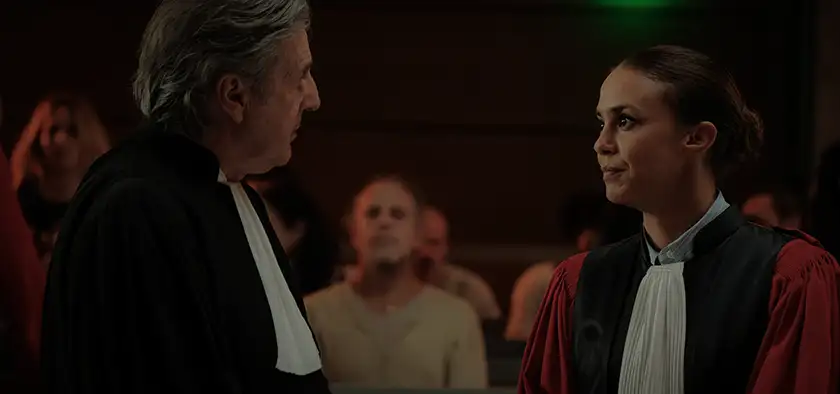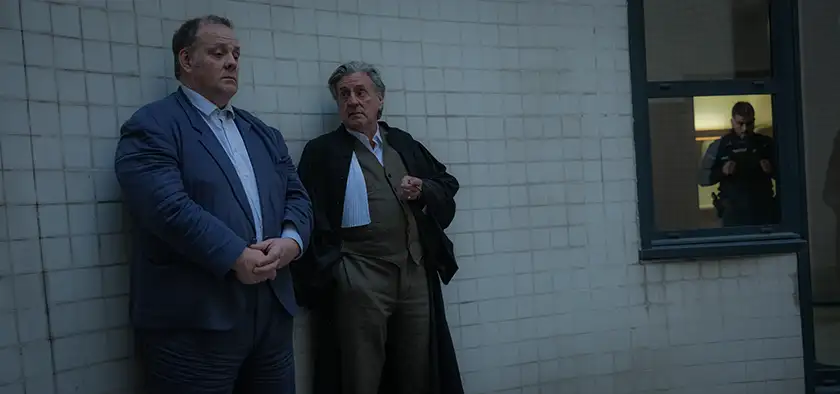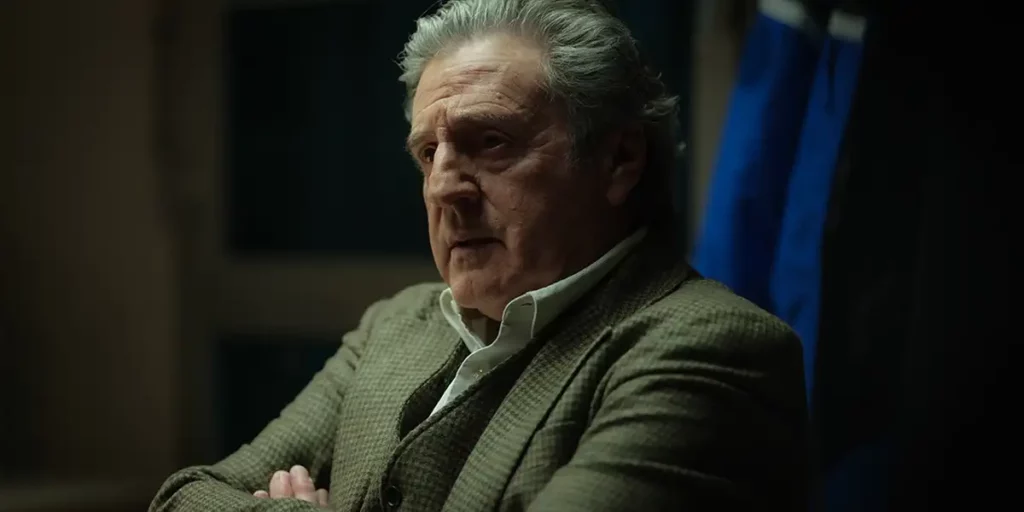We interview director-star Daniel Auteuil on his latest film Le Fil (An Ordinary Case), where he plays a lawyer who gets entangled in a case that’s more complex than it looks.
Despite the film’s title, the subject matter of Daniel Auteuil’s latest film is no “ordinary case”. Presented at the 2024 Cannes Film Festival as a special screening, Le Fil (An Ordinary Case) centers on a criminal lawyer named Jean Monier (Auteuil) who hasn’t been taking new clients for a long time, due to an error in judgement he made in the past. But there’s something about Nicolas Milik (Grégory Gadebois) – a father who’s about to stand trial for his wife’s murder – that makes him want to defend him. Despite all evidence pointing to Milik, Jean Monier is convinced of his innocence. Throughout the film, we follow his investigation, which uncovers various truths that shift both the jury’s and our own convictions about the case. Until we finally get to the bottom of it and are left with a very clear message: things are not always what they seem.
Le Fil (An Ordinary Case) is inspired from a real case, and it’s a controversial watch, as it will make many people talk about its ending. It’s also a compelling thriller that will keep you engaged throughout, thanks to fantastic acting – not only from Auteuil and Gadebois, but also from Alice Belaïdi as the prosecutor, and singer-songwriter Gaëtan Roussel, who plays a key character in the case – and a well-paced screenplay, and that will certainly appeal to true crime fans.
At the 2024 Cannes Film Festival, we spoke with Daniel Auteuil about his new film, which marks his return behind the camera six years after his previous directorial effort, The Other Woman (Amoreux De Ma Femme). The Caché star is also co-writer and protagonist of Le Fil (An Ordinary Case), and the movie is the ninth film in which he’s involved to be screened at the Cannes Film Festival. Though Auteuil didn’t want to talk about the ending of the film, to avoid spoiling the experience for the audience, he talked to us about his approach to story, his characters, and what attracted him about the world of criminal justice. Read the interview below!
Daniel Auteuil on the Setting & Characters of Le Fil (An Ordinary Case)
What drew you to the to the world of criminal justice?
Daniel Auteuil: The courtroom is a place where you meet the worst examples of humanity. It’s also a piece where you meet other men and women who are called to defend such “monsters,” and whose arguments are strong enough to make you see the humanity in them.

How did you approach the writing process for your own character?
D. A.: I wrote Jean Monier as someone who, in the past, had managed to get someone acquitted of a murder charge, but that man committed another murder as soon as he got out of jail. That totally destroyed the lawyer’s life, and he decided to give up on no criminal law: it was a huge crisis for him. Fifteen years later, [when we meet him in the film] simply by chance, he’s again confronted with someone who’s also accused of murdering someone, and who’s distress. The lawyer has such empathy for him that he decides to become involved in a case again, and take up the defence.
Unlike his ex-wife, who’s also a lawyer [Maître Annie Debret, played by Sidse Babett], and his other colleagues, Jean Monier has a problem with empathy. It’s his weakness: he doesn’t know how to create a line between himself and the clients. He’s like a child in that respect: others warn him, telling him that he’s making a mistake, but he refuses to listen, which leads to this becoming the “fight” of his life.
Did you always know that you wanted to cast yourself as the protagonist?
D. A.: Initially, our producer thought it would be good for Jean Monier to be a young lawyer, and for the film to depict his illusions and how they are destroyed by the story. I felt it would also be interesting to have the protagonist be someone who had already lost his illusions fifteen years before, and whose meeting with the accused makes him want to work again, because it rekindles his love for justice, and for his job.
How did you cast your co-stars?
D. A.: I was drawn to Grégory Gadebois [for the role of Nicolas Milik, the accused] because he has the eyes of a child and the body of an adult. He’s a fantastic actor, and I thought it’d be really interesting to see a confrontation between him and myself. As for the lawyers and the people at the trial… The world belongs to young people, and I wanted the courtroom to reflect it, so I filled it with young people, from the judge and the district attorney to the other people there. The district attorney [played by Suliane Brahim] is someone who has a great deal of respect for her antagonist, Jean Monier, but she still wants to crush him, so there’s an interesting relationship there.
The Story of Le Fil (An Ordinary Case)
Can you tell us about the story that inspired Le Fil?
Daniel Auteuil: It’s based on a true story: a blog written by a very young lawyer, who died two years ago. [The criminal lawyer, who came from Lille, was Jean-Yves Moyart, using the alias Maître Mô, and his stories were then collected into a book: “Au Guet-apens: Chroniques de la Justice Pénale Ordinaire”]. I allowed myself a certain freedom [to make the story more compelling on a cinematic level], but I wanted to remain faithful to the real tale, for the family and children of the people involved, and for the lawyer himself and the passion he had for his job.
What was your process like as you were adapting the story?
D. A.: I played with the chronological order [in terms of how and when things are revealed to the audience]. And then, I lied to you for two hours: I kept giving you clues that would lead you in a certain direction, only to deceive you again, to reflect the nightmare that the character itself is experiencing.

Other recent releases have tackled a similar subject – for example, Anatomy of a Fall and The Goldman Case – and been very successful. What do you think it is that draws audiences to these stories?
D. A.: For me, those are all stories about justice. Just like the western, romance or other genres, courtroom dramas date back to ancient time: we’ve never stopped telling tragedies, and we keep turning to them [because there’s something about them that makes them so gripping]. The closed universe of the courtroom allows us to focus better and immerse ourselves in the story. On top of this, what interested me in this specific story was getting into my characters’ minds, and sensing the nightmare in which they were involved.
Plot-wise, Le Fil attempts to determine if one of the characters is innocent or guilty. But the film also explores how difficult it can be for a lawyer to do their job without getting personally involved in the case.
D. A.: That’s what makes the story so fascinating. If the protagonist was a hero, there’d be no story. Weaknesses allow you to tell a story, and also nourish you as an actor.
Thank you for speaking to us!
This interview was conducted in French with a translator and then edited for length and clarity.
Le Fil (An Ordinary Case) had its World Premiere at the 2024 Cannes Film Festival. The movie will be released in French cinemas by Zinc on September 11, 2024.

